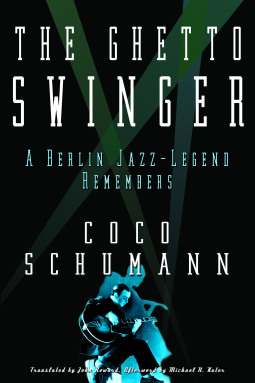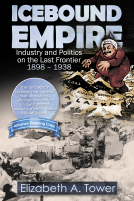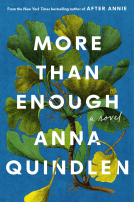
The Ghetto Swinger
A Berlin Jazz-Legend Remembers
by Coco Schumann
This title was previously available on NetGalley and is now archived.
Send NetGalley books directly to your Kindle or Kindle app
1
To read on a Kindle or Kindle app, please add kindle@netgalley.com as an approved email address to receive files in your Amazon account. Click here for step-by-step instructions.
2
Also find your Kindle email address within your Amazon account, and enter it here.
Pub Date Jan 19 2016 | Archive Date Dec 28 2015
Smith Publicity | DoppelHouse Press
Description
"Coco, it's not important what you play. It's important how you play it," said Louis Armstrong to jazz and swing guitarist Coco Schumann during a break between sessions. Recalling this episode Schumann reminds readers that even in the midst of real-world nightmares, music is alive and musicians experience this essential freedom and hope, which they can, in turn, give to their audiences. Throughout his remarkable life, Coco Schumann (b. 1924) would accumulate accolades, including the Order of Merit from the Federal Republic of Germany in 1989 and the prestigious Ehrenpreise Lifetime Achievement Award in 2015, and play with jazz greats Toots Thielemans, Dizzy Gillespie, Louis Armstrong, Ella Fitzgerald, and others. But few knew he relied on composing music and performing for live audiences to ease the burden of his wartime memories.
After forty years of silence Schumann's memoir opened a rare window into the previously unknown life of one of Germany's most renowned musicians, who was a member of the vibrant and illegal Berlin club scene, a part of the cultural revival of postwar Berlin, and a survivor of Theresienstadt (Terezin) and the horrors of Auschwitz.
Shortlisted for the 2017 A.R.S.C. Awards for Excellence in Historical Research in Jazz.
Includes over 50 historical documents and rare photographs.
A Note From the Publisher
Translated by John Howard | Contributors Max Christian Graeff, Michaela Haas, Michael H. Kater
Marketing Plan
Coco Schumann (1924 - ) is known as one of the best swing and jazz musicians of his time in Europe. In the 1940s, as a teenager, he began playing in underground swing clubs in the Berlin scene and continued to do so illegally during the war. After being arrested in 1943 and sent to Theresienstadt concentration camp, he performed with The Ghetto Swingers, a jazz band made up of some of the best musical talent in Europe. Later in Auschwitz-Birkenau, Schumann had a close call with the infamous Dr. Josef Mengele and survived day-by-day as a musician forced to play for the SS, for corrupt and sadistic guards, and streams of people as they were sent into the gas chambers. Ultimately, he was sent to a remote camp of Dachau where he contracted spotted fever, and was then forced on a death march to Innsbruck. An American battalion intercepted this march and liberated them.
Schumann has spent his lifetime playing jazz and swing. He taught at a music conservatory in Steglitz-Zehlendorf for many years and began telling his story in the 1980s at schools in Germany and for documentaries on German and British television, as well as putting out new song collections; his latest collection appeared last year. His life story has been made into a graphic novel and musical stage productions, and has been optioned as a feature film, but his incredible journey has never been told fully for English-speaking audiences.
When he turned 90 years old in 2014, Schumann retired from public performances, and in 2015 he received the prestigious Ehrenpreise Lifetime Achievement Award.
Available Editions
| EDITION | Other Format |
| ISBN | 9780983254041 |
| PRICE | $24.95 (USD) |
Average rating from 24 members
Featured Reviews
 Leslie G, Book Trade Professional
Leslie G, Book Trade Professional
at first I worried this was going to be folksy and also despite its tragic elements, a story I had heard before of Holocaust suffering - sometimes a very insular theme - as if you had to be an initiate. The worldy wise voice telling this story slams through to get to the entertainment and the music: terrific survival skills - and the slight sense that you could get off the track if you adhere to the ways of the world. in some sense his decision as a young man to stick the star signifying his background into his pocket and 'hide' in the open as a performer may seem reprehensible - but in fact it is survival technique and cocks a hoop at the stigmatiation of the Jew (in this case) - why should he adhere to the Nazi decision that different races deserved different treatment - look to the samenesses is the implication. the story of his rise is miraculous in its way but clearly founded on enormous talent and drive - this is an inspirational and utterly readable account - I hope it will reach a wide audience!
 Gloria R, Bookseller
Gloria R, Bookseller
Thanks to the publisher and Netgalley for an eARC of this book What an interesting book! Written in a conversational tone, Coco Schumann tells his story. One feels that you are with him. The first part of the book when he talks about his childhood and the time he spent in the camps is very detached and unemotional. He obviously cannot bear to engage emotionally with this time as he tells his story.
He becomes much more involved when he starts talking about his life after the camps. He goes into great detail aabout the jobs he had and the musicians he played with. Made me wish I knew more about all of them.
The writing is not the greatest and I imagine some things are lost in the translation from German to English but all in all, the translator did an adequate job. The book was pleasant to read and, in ways, the informality added to the feeling that one was listening to an old friend tell his story.
3.5 stars.
 Jess C, Reviewer
Jess C, Reviewer
I received a free copy of this book from the publishers via NetGalley in exchange for an honest review.
I have been reading a lot about the Holocaust lately, specifically the accounts of witness who experiences the atrocities that took place in concentration camps.
This book is not just about the Holocaust, this book is about the life and career of Coco Shumann. I have to say, it was a refreshing take on a horrific time in history.
Coco Shumann truly is a musician who just happened to be in a concentration camp, not a victim of the Holocaust that happens to play music....he sums it up much better in the book, though!
Coco did not let the horrible things that happened to him during WWII define him. Throughout it all, it was always about the music.
I think people overlook the many other things that happened during WWII, such as the swing and jazz club scene in Berlin, and its subsequent ban. I, for one, was completely unaware of its popularity and the dangers that were involved in being a musician during that time.
The edition of the book that I read was translated to English. I believe it was translated rather well. Although it was not the best written book I've ever read, it certainly was not the worst. However, I feel reading it in its original language might add some meaning in some instances.
This book gave me a completely different perspective of life during WWII. I would (and already have) recommended it to others.
 melvin u, Reviewer
melvin u, Reviewer
My knowledge of the jazz bands and musicians of the 1930s is very limited. My feeling for the great cultural evil of the Holocaust is personalized for me by the death of Iréne Nemirovsky at Auschwitz. I knew the Nazis burned many books and greatly restricted the publishing industry. I knew many Jewish writers like Stefan Zweig, Herman Broch, Joseph Roth and Stefan Zweig went into exhile. What I did not know was that the Nazis also censored much music. They regarded Jazz music as played by artists like Bennie Goodman and Louis Armstrong as the products of corrupt races. Schumann does a wonderful job of taking us on tour of the Berlin nightclub world. Schumann was just a young man when he first started playing in clubs and for him it sure beat being a laborer or a cook and the Weimer ladies took to the movie star handsome Coco with great fondness. It was a fast life style and Coco loved it. He met many of the greats of the Jazz world when they came to play in Berlin. He was a drummer and a guitarist. Musically he was incredibly talented.
Sadly he was arrested as a Jew and sent to a death camp. His miraculous survival was owed to his musical talents. He was in the Terizen Concentration Camp. The Nazis used this camp to show international organizations like the Red Cross that inmates were treated quite humanely. (I was very saddened to learn that many Jews were marketed spaces in Terizen almost like it was a Club Med, being charged huge fees for what they were told guaranteed their safety.) The camp management and guards wanted to have a band for their own enjoyment, to pacify inmates and to show outside observers how well Jews were being treated. Schumann joined a band given the name The Ghetto Swingers. The concentration camp had a large number of musicians including many top classical musicians as well as Jazz and Swing style performers. Any day now in a camp could be your last but Coco survived through his music, his networks of other musicians, his robust strong young health and his high intelligence.
There is much about day to day life in the camps. Schumann was released at the end of the war and he went back into the night club scene, at first fueled by American money and German women eager to meet allied soldiers. It was kind of like a terrible miasma of gloom had been lifted from the city. Schumann meets and falls in love with a wonderful woman. He marries. He is not terribly comfortable as a Jew in Germany, who would be, and with the help of some contacts, he and his wife emigrate to Australia. At first he does construction work, where you worked as an emigrant was mandated by the Austrslian government, but he soon hooks up with other musicians and becomes quite a success. However, he gets homesick for Germany and he and his wife move back. Coco goes on to achieve international status as a jazz guitarist.
To me the most fascinating aspect of the book was learning how the Nazis turned on Berlin musicians as well as the account of how music saved his life once he was in the camp. There was more to the Nazis war on culture than book banning.
The Ghetto Swingers is very well narrated, the translated prose reads smoothly. It is an important addition to English language Holocaust Memoirs. I am glad I read it.
Mel u
 Amanda R, Librarian
Amanda R, Librarian
I'm a big fan of swing music and of the film Swing Kids, and this memoir fit in nicely in my wheelhouse. It's a really fascinating memoir - now for the first time in English - about a young German jazz musician who put his heart and soul into his music during the Nazi regime. Being half Jewish, he ended up in a concentration camp, but was able to use his music to survive. He ultimately spent time in Theresienstadt, Auschwitz, and Dachau. It's pretty amazing to have this witness to Nazi atrocities who was able to play music while an inmate. The last half of the book is his life after the war, who he found who also survived, meeting his wife, playing in bands, touring, meeting celebrities. There never seemed to be a dull moment with this man! There are so many anecdotes it's like a cool old uncle telling you about his life and kind of downplaying how amazing it was. At times I got a little lost with all the names being dropped, and all the places he played in, but not enough to keep me from reading. A definite recommended read for anyone interested in mid-century music and Germany in the 30s-60s.
The title may actually confuse some readers, because when they hear "ghetto," they think of gangs in New York or similar settings from a movie. The fact that ghettos can actually be in any large city worldwide seems to occur to only a small percentage of people. It wasn't as misleading to me because of all the WWII stories I have read over the past year; many of them mentioned the Jewish ghettos created by the Nazis to contain unwanted citizens. So I decided to read this book based on my interest in history and my love of music.
It seems that Coco Schumann and I share that love of all things musical. During his long and interesting career he has played almost every type of popular music and had the privilege of meeting or even performing with legends such as Ella Fitzgerald and Louis Armstrong. Watching through Coco's eyes and seeing the music scene change over the years (some of them long before I was even born), was like seeing a time-lapse movie of pop culture. The book covers the pre-war years of 1930s Germany up to the present day and the songs and styles of the times are his anchors in each decade or era.
For those who have never heard of Coco Schumann, he is a musician born in Germany to an "Aryan" father and Jewish mother after World War I. Even though his father had served in the German army during WWI and his family had a long history of service and loyalty to their country, Coco was sent to a concentration camp along with thousands of others from the Berlin area. He actually spent time in three camps - Theresienstadt, Auschwitz, and Dachau. As with anyone who survived the horrors of the camps, it is a miracle he lived. But it is an even greater miracle that he has remained as positive and friendly as he is. He credits music with saving him, both literally and figuratively. It saved him physically because the camp officers enjoyed having musicians to play for them and entertain them, so they spared his life. But it also saved his sanity and humanity by giving him something to cling to as an anchor and a connection to better times.
Since Coco never emigrated to America, his name is not well known except among music aficionados. His biography tells of how he first became attracted to the musical scene in Berlin and spans his career in Germany and abroad, with performances on board cruise ships, in jazz clubs, for campaign rallies, TV and radio shows, jazz competitions, and countless other appearances. The book does talk about his time in the ghetto and in the camps, but without going into excruciating detail. Instead, it focuses on the music and its importance to him.
For history buffs this is an interesting addition to the literature about the time period of the Nazi rise to power and its effects on European Jews. For music lovers, it traces the influence of war and culture, as well as technological breakthroughs such as TV and radio, on popular music. This is a book that keeps readers interested and ready to hear more.
Readers who liked this book also liked:
We Are Bookish
General Fiction (Adult), New Adult, Romance
We Are Bookish
LGBTQIAP+, Romance, Sci Fi & Fantasy


















